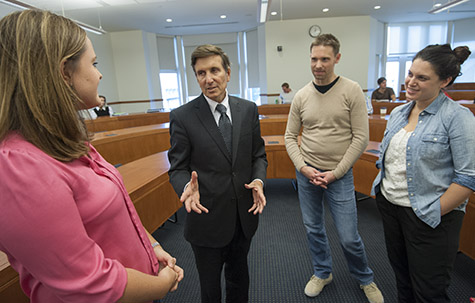
To truly understand corporate law in America, the study must go through Delaware, long the favored state of incorporations for U.S. business.
More than half of U.S. publicly traded corporations, and 60 percent of Fortune 500 companies, are incorporated in the state due in large part to an 1899 general incorporation act aimed at attracting more businesses.
Another reason is the state’s highly respected court system, including its Supreme Court and its corporations court, the Delaware Court of Chancery.
Washington University in St. Louis law students annually get a firsthand look at how these important courts operate through the eyes of Delaware Supreme Court and chancery judges who come to St. Louis to deliver lectures and seminars. The students also can work in the Delaware courts through corporate judicial externships and clerkships.
Each fall, Delaware Supreme Court Justice Randy J. Holland, an adjunct at Washington University School of Law, teaches an intensive weekend course on corporate governance and control, giving students his “view from the bench” into how corporate law cases are decided.
The course, planned with the help of Hillary Sale, JD, the Walter D. Coles Professor of Law, is one in a series of courses taught by high-ranking Delaware judges.
In November, Vice Chancellor Donald F. Parsons of the Delaware Court of Chancery will come to campus to teach students about alternative business entities, said Sale, who is also professor of management by courtesy at Olin Business School. Vice Chancellor Sam Glasscock III will teach an intensive course on problems in corporate law in the spring semester.
A closer look at the program:
What do Law School students studying corporate law achieve by having such close interactions with the people who make these laws?
Sale: “This is an incredible opportunity for our students. In the world of corporate law, these judges are rock stars. The leadership at the School of Law has worked very hard to expand the connections between Delaware and St. Louis, and we are able to offer a unique program that most of the other top law schools do not. In addition to coming here to teach, we’ve had several students do externships and clerkships in Delaware, where they get firsthand perspective on these important issues.”
Holland: “I really enjoy sharing information about our court system with these students. I like explaining how cases fit together and connect to make a larger picture, rather than looking at them as isolated cases. I also like talking about writing these cases from a firsthand perspective. I get great feedback from the students.”
Over the years, many students have worked in the Delaware court system. What do they gain from that experience?
Holland: “Through the Law School, there is a program where students can work with me or with the Court of Chancery for a semester and earn credit while doing it. It’s a great opportunity for them to gain real world experience and to see how decisions are made from inside the courts. Professor Sale has an incredible track record for sending the best students our way, and they end up learning and contributing a great deal.”
Sale: “Externships are for one semester, and are a unique way for students to work in the chambers alongside judges and law clerks. They are able to learn about corporate law and how it is made from inside the judiciary. Clerkships are akin to post-graduate fellowships in law and are very hard to come by. In Delaware, clerkships are so prestigious — because of the reputation of the courts — that top students from around the country apply there. Our large representation in Delaware is, quite frankly, a big deal. Students learn from the finest judges and lawyers in the country and are able to form a life-long mentorship with a judge.”
Zach Greenberg, 2013 School of Law graduate: “My clerkship with Justice Holland was about so much more than just reading case law and drafting memos and opinions. My experience offered the opportunity to learn how to think and act like a lawyer, lessons that I am putting to use today in private practice. Even having enjoyed such a remarkable career, Justice Holland is first and foremost a teacher. I recall numerous conversations in his office during which what started out as a tangled, complicated issue for me was whittled down to its most elementary pieces. For all of the accolades hanging on his walls, it was his uncanny ability to pull back the weeds and expose the fundamental issue that I appreciated most about my time with Justice Holland.”